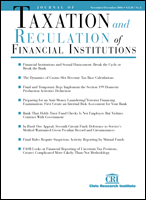Issues for U.S. Beneficiaries of Foreign Grantor Trusts Upon the Grantor’s Death: Tax Consequences and Possible Solutions
Author: Arturo J. Aballi.; Megan E. Campos.; Gustavo Oliveira.
Source: Volume 30, Number 02, Winter 2017 , pp.47-57(11)

< previous article |next article > |return to table of contents
Abstract:
Under the Internal Revenue Code, the estate of a nonresident, noncitizen decedent includes shares of a United States company at the time of his or her death and only up to $60,000 may be exempt from tax. Therefore, a common structure used by many foreign high-net-worth individuals investing in financial assets in the United States is to set up a non-U.S. corporation whose shares are owned by a grantor trust. This trust becomes irrevocable upon the investor’s death and most often has U.S. beneficiaries. This article discusses tax consequences in regard to this particular structure. Financial institutions with private client divisions that deal with international or cross-border families should be aware of these issues because- of the potentially adverse United States tax consequences and additional reporting requirements that could arise for the U.S. beneficiaries.Keywords: estate planning; domestic vs. foreign trust; court test; control test; throwback rules; undistributed net income; controlled foreign corporation rules; passive foreign investment company rules; trust accounting
Affiliations:
1: Aballí Milne Kalil; 2: Aballí Milne Kalil; 3: Aballí Milne Kalil.